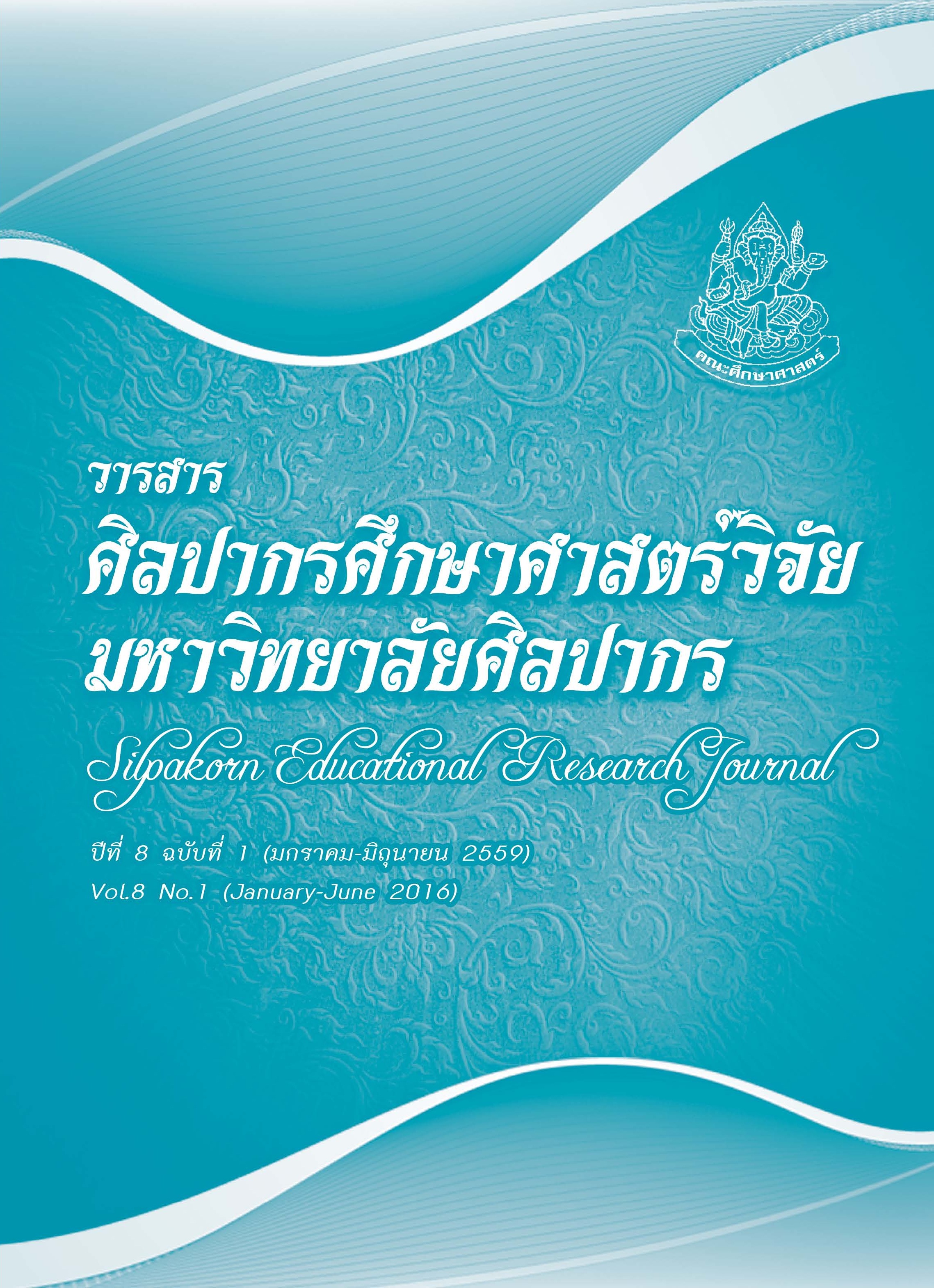การพัฒนาโปรแกรมโดยใช้ชุมชนเป็นฐานในการเรียนรู้คติชนวิทยาระดับอุดมศึกษา (The Development of community – based program on Thai the Folklore in Higher Education)
คำสำคัญ:
การพัฒนาโปรแกรม / การเรียนรู้คติชนวิทยา / ชุมชนเป็นฐานบทคัดย่อ
การพัฒนาโปรแกรมโดยใช้ชุมชนเป็นฐานในการเรียนรู้คติชนวิทยา ระดับอุดมศึกษา
The Development of community – based program on Thai the Folklore in Higher Education
การพัฒนาโปรแกรมโดยใช้ชุมชนเป็นฐานในการเรียนรู้คติชนวิทยาระดับอุดมศึกษา
The Development of community – based program on Thai the Folklore in Higher Education
ชวนพิศ สิริพันธนะ *
Chuanpit siriphantana
รสุเทพ อ่วมเจริญ**
Sutep uamcharoen
บทคัดย่อ
วัตถุประสงค์ของการวิจัยคือ 1) พัฒนาโปรแกรมโดยใช้ชุมชนฯ 2) เพื่อพัฒนาและทดลองใช้โปรแกรมโดยใช้ชุมชนเป็นฐานฯ 3) เพื่อศึกษาประสิทธิภาพของโปรแกรมโดยใช้ชุมชนเป็นฐานฯ กลุ่มตัวอย่าง คือ มหาวิทยาลัยราชภัฏนครปฐม ในการทดลองใช้โปรแกรม และเลือกนักศึกษาสาขาวิชาภาษาไทยที่มี ชั้นปีที่ 2 จำนวน 3 กลุ่ม เลือกโดยอาสาสมัครจำนวน 1 กลุ่ม รวม 35 คน ในปีการศึกษา 2557 ระยะเวลาในการสอน 16 สัปดาห์ ๆ ละ 4 คาบ กลุ่มตัวอย่างได้มาโดยการเจาะจง เครื่องมือวิจัยคือ รายละเอียดรายวิชาคติชนวิทยา (มคอ.3) แผนบริหารการสอน 12 แผน คู่มือกิจกรรมศึกษาชุมชน แบบทดสอบผลการเรียนรู้คติชนวิทยา แบบสอบถามความคิดเห็นต่อการเรียนการสอน วิเคราะห์ข้อมูลโดยการทดสอบค่าที (t-test) และการวิเคราะห์ค่าความถี่ ค่าร้อยละ และการวิเคราะห์เนื้อหา (Content Analysis)
ผลการวิจัยมีดังนี้
1. ผลการศึกษาการพัฒนาโปรแกรมโดยใช้ชุมชนเป็นฐานฯ พบว่า กระบวนการพัฒนาโปรแกรมที่พัฒนาขึ้นตามลำดับขั้นการพัฒนาโปรแกรมโดยใช้ชุมชนเป็นฐานฯ ที่มุ่งกำหนดบทบาทของผู้สอนและผู้เรียน 4 ขั้น ดังนี้ (1) การวางแผน (Plan : P) (2) การออกแบบการเรียนการสอน (Instruction : I) (3) การบริหารการเรียนรู้ (Implementation : I) (4) การวัดผลและประเมินผล (Evatvation : E)
2. ผลการเรียนรู้ก่อนและหลัง พบว่า คะแนนเฉลี่ยหลังเรียนสูงกว่าคะแนนเฉลี่ยก่อนเรียนอย่างมีนัยสำคัญทางสถิติที่ระดับ .01
3. นักศึกษามีความคิดเห็นต่อการใช้โปรแกรมโดยใช้ชุมชนเป็นฐานฯ อยู่ในระดับมาก คือ ผู้เรียนได้เรียนรู้เกิดการเรียนรู้จากสิ่งรอบตัว รองลงมาคือ ผู้เรียนเรียนรู้สิ่งที่ดีงามจากศาสตร์สาขาต่าง ๆ
และช่วยบูรณาการสิ่งที่เรียนกับชีวิตจริงตามลำดับ
คำสำคัญ :การพัฒนาโปรแกรม / การเรียนรู้คติชนวิทยา / ชุมชนเป็นฐาน
Abstract
The purposes of this research were to: 1) develop the community-based programe on Thai folklore in higher education; 2) develop and experiment on using the program in the folklore-based community for graduate students and 3) study the efficiency of the program in the folklore-based community for graduate students. Population was NakhonpathomRajabhat University as well as the experimental group in this experiment using the programe, and the sample is the second year students of Thai Education major who studied Thai folklore course in 2014 Academic Year. The volunteers were divided into three subgroups of 35 people each. The instruction was preformed over a period of 16 weeks, four hours per week. The sample was selected from the volunteers purposively. The research instruments were defined from the TQF3 of Thai folklore course. The twelve management plan to teach.The handbook of Thai folklore course.The learning outcome test.The questionnaires on students’ opinions toward the instruction. The obtained data were analyzed by t-test, mean, standard deviation, percentage and content analysis.
The research results were as follows;
1. The research of the development of community-based program on Thai Folklore in higher education consisted of four steps; Plan : P, Instruction : I, Implementation, and Evaluation.
2. The learning outcome scores before and after the instructions were significantly different at the 0.1 level.
3. The students’ opinions towards the instruction were at the “strongly agree” level. The top comments were: 1) the programme encourages learners learning from surroundings; 2) the programme gain learner’s informative knowledge from other fields; 3) the programe helps to integrate leaner’s actual life experiences respectively.
Key words: The Development of Community-Based Program, Learning Thai folklore, Community-Based Program
*นักศึกษาปริญญาปรัชญาดุษฏีบัณฑิต สาขาวิชาหลักสูตรและการสอน คณะศึกษาศาสตร์ มหาวิทยาลัยศิลปากร
**อาจารย์ที่ปรึกษา รองศาสตราจารย์ ดร. ภาควิชาหลักสูตรและวิธีสอน คณะศึกษาศาสตร์ มหาวิทยาลัยศิลปากร





